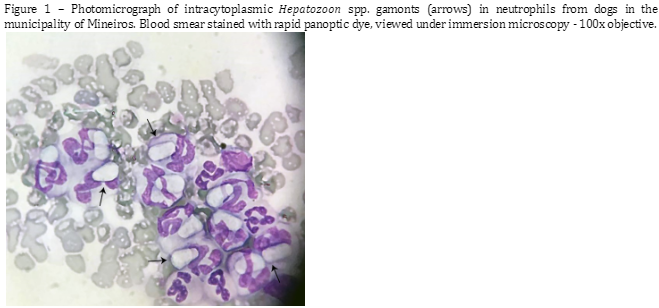Epidemiology and hematological analysis of dogs naturally infected by Hepatozoon spp. from central Brazil - retrospective study
DOI:
https://doi.org/10.21708/avb.2024.18.2.12047Abstract
Hepatozoonosis is a hemoparasitosis caused by intracellular protozoa of the genus Hepatozoon, transmitted to dogs and other carnivores by parasitized ticks, such as Rhipicephalus sanguineus and Amblyomma spp. Its prevalence varies by geographic region, favoring tropical and subtropical areas. Hepatozoon spp. infection cause nonspecific clinical manifestation. This longitudinal retrospective study aims to highlight the epidemiological and hematological aspects of dogs naturally infected with Hepatozoon spp. in the municipality of Mineiros, state of Goiás, Brazil, between 2018–2022. This study considered the following information: age, sex, breed, distribution of cases over the years, seasonality, and hematological profile. A total of 272 domestic dogs were found to be parasitized by Hepatozoon spp. using the blood smear technique. Adult dogs were more likely to be affected by hepatozoonosis, with no breed or sexual predisposition. This study showed an exponential increase in cases diagnosed over the years, particularly in autumn and winter (the dry season). Within the study’s evaluation criteria, most dogs had anemia, thrombocytopenia, and hyperproteinemia; however, there were no changes in the total leukocyte count.
Downloads

Downloads
Pubblicato
Fascicolo
Sezione
Licenza
Copyright (c) 2024 Acta Veterinaria Brasilica

TQuesto lavoro è fornito con la licenza Creative Commons Attribuzione 4.0 Internazionale.
Autores que publicam na Acta Veterinaria Brasilica concordam com os seguintes termos: a) Autores mantém os direitos autorais e concedem à revista o direito de primeira publicação, com o trabalho simultaneamente licenciado sob a Licença Creative Commons Attribution que permite o compartilhamento do trabalho com reconhecimento da autoria e publicação inicial nesta revista. b) Autores têm autorização para assumir contratos adicionais separadamente, para distribuição não-exclusiva da versão do trabalho publicada nesta revista (ex.: publicar em repositório institucional ou como capítulo de livro), com reconhecimento de autoria e publicação inicial nesta revista. c) Autores têm permissão e são estimulados a publicar e distribuir seu trabalho online (ex.: em repositórios institucionais ou na sua página pessoal) a qualquer ponto antes ou durante o processo editorial, já que isso pode gerar alterações produtivas, bem como aumentar o impacto e a citação do trabalho publicado (Veja O Efeito do Acesso Livre).


 Esta obra está licenciada com uma Licença
Esta obra está licenciada com uma Licença 